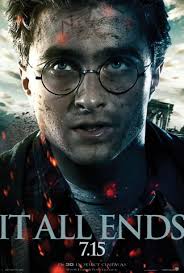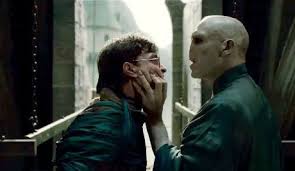When you have a saga as long and beloved as Harry Potter, the finale is always the hardest part. Expectations are naturally at unspeakable highs, and it has to meet all of those expectations through providing closure that fits a number of different opinions. It's a monumental task, one that J.K. Rowling accomplished in the novels on which the movies are based. But that doesn't guarantee that the films will be equally accomplished: the films have differed greatly from the books, sticking with the important stuff but developing a narrative language of their own. And though it's not a perfect film, Harry Potter and the Deathly Hallows, Pt. 2 is a fitting finale and, by far, the best film in the series.



The narrative, too, takes a much more liberal approach to adapting the books. Some of the events are out-of-order, and the interesting-in-the-book, not-so-much-on-screen side plot about the Dumbledore biography has been cut from both Deathly Hallows. Steve Kloves, who's written the script for every Potter film sans Order of the Phoenix, has done a great job at adapting the books, focusing on what drives the narrative forward and cutting a lot of the fat of the books. And though an unfortunate number of deaths of beloved characters occur off-screen, several fan favorites made it to screen, particularly, to the ecstatic applause of the people at my screening, Mrs. Weasley going all Ellen Ripley ("Not my daughter, you bitch!") on Bellatrix Lestrange (coincidently, I saw this the day after Aliens 25th anniversary).

The film begins right where Deathly Hallows, Pt. 1 left off: Voldemort (Ralph Fiennes) now has the Elder Wand, and he's ready to finish the job he started so many years ago: killing Harry Potter (Daniel Radcliffe). Harry, Ron (Rupert Grint), and Hermione (Emma Watson), however, are still seeking and destroying Voldemort's Horcruxes, objects that house pieces of his soul. Once they are all destroyed, Harry can finally kill Voldemort. However, their duel of fate will claim many others, and will take turns that neither party had ever expected.
The greatest magic trick that DH2 pulls off is showing how the films have matured over the years. I'll be writing more about this in a follow-up post on the entire series, but when you go back and look at Harry Potter and the Sorcerer's Stone, you can see just how far the series has come from a technical standpoint. Credit much of this to director David Yates, who's helmed every film since Order of the Phoenix, and a rotating set of cinematographers that, in the past, have included John Seale (The English Patient), Slawomir Idziak (Black Hawk Down), and Bruno Delbonnel (Amelie). Both parts of Deathly Hallows were shot by Eduardo Serra, who in this installment uses such dark palettes that the film is practically in black-and-white. And yet Yates and Serra create some of the most astonishing, breathtaking images that the series has seen. None of the early films would have dared include those magnificent shots of Harry's and Voldemort's eye, the former's being his right eye in the right side of the screen (the side of good), the latter's left eye in the left corner (the side of the Latin sinister, or evil). This is sophisticated work from a film about wizards.

The narrative, too, takes a much more liberal approach to adapting the books. Some of the events are out-of-order, and the interesting-in-the-book, not-so-much-on-screen side plot about the Dumbledore biography has been cut from both Deathly Hallows. Steve Kloves, who's written the script for every Potter film sans Order of the Phoenix, has done a great job at adapting the books, focusing on what drives the narrative forward and cutting a lot of the fat of the books. And though an unfortunate number of deaths of beloved characters occur off-screen, several fan favorites made it to screen, particularly, to the ecstatic applause of the people at my screening, Mrs. Weasley going all Ellen Ripley ("Not my daughter, you bitch!") on Bellatrix Lestrange (coincidently, I saw this the day after Aliens 25th anniversary).
The actors, too, have grown up significantly over the years, and everyone gets at least a moment to shine as they bid farewell to their characters (Warwick Davis gets to play Flitwick and Griphook one last time, with great aplomb; though I loved her big moment with Alan Rickman's Snape, the film definitely could have used more of Maggie Smith's Professor McGonagall). Of course, Radcliffe, Grint, and Watson show that they are legitimate actors, and hold the screen well, and Fiennes hams it up enjoyably one last time as the Dark Lord. It's not the stuff that Oscar dreams are made of, but keep an eye on those kids: all of them have great futures ahead of them.
I have to admit that it's hard for me to be really objective about this movie. I was one of those kids who partially grew up on Harry Potter, and I do consider myself a fan of the series. So maybe the grade is a little inflated, but it's not dishonest. This final chapter really is a great piece of cinema, one that ends the most profitable franchise ever with a demand to be taken seriously as art too. I'd say it passes its N.E.W.T.s with flying colors. A
Comments